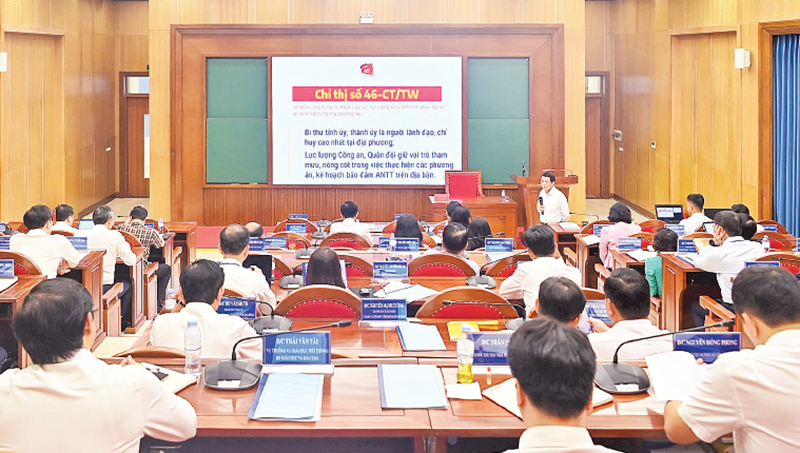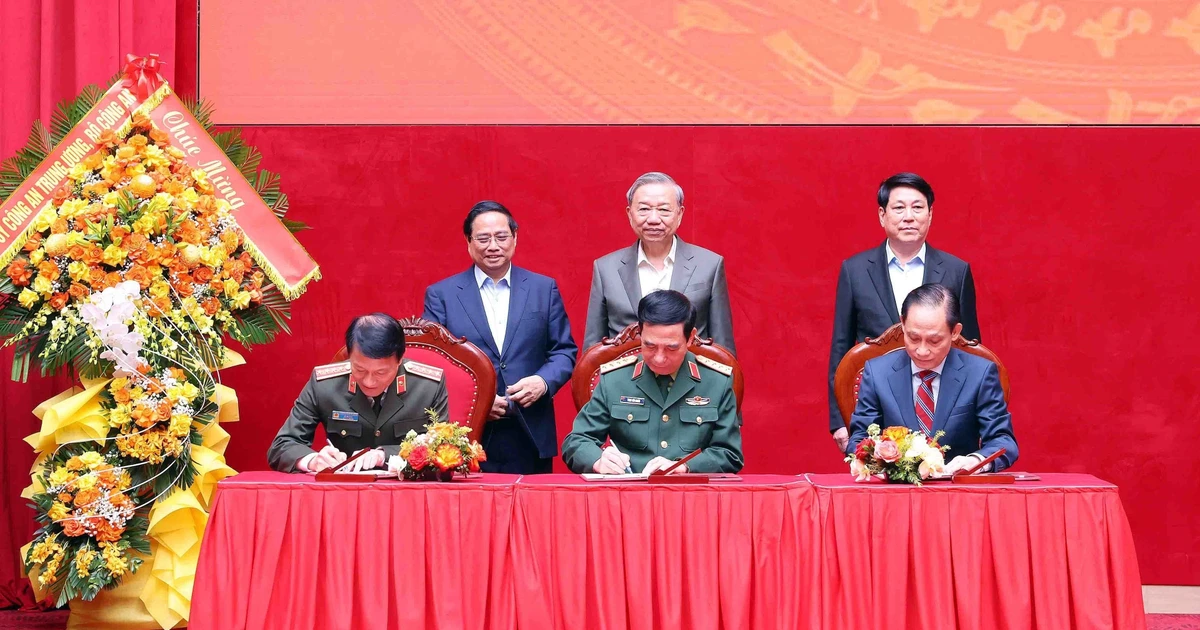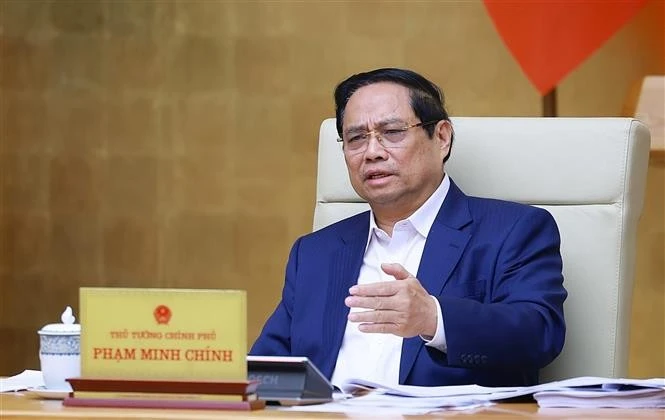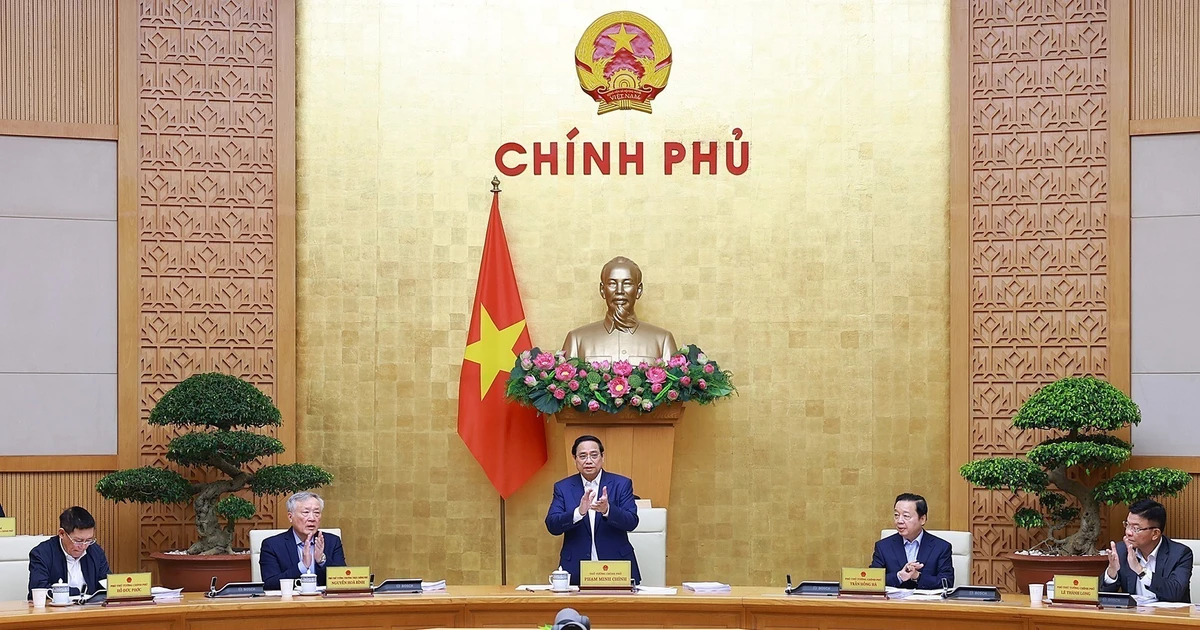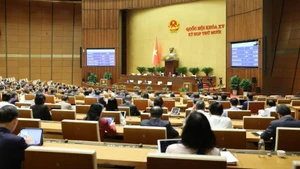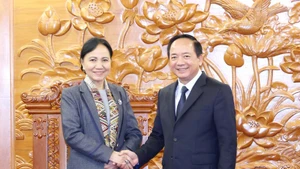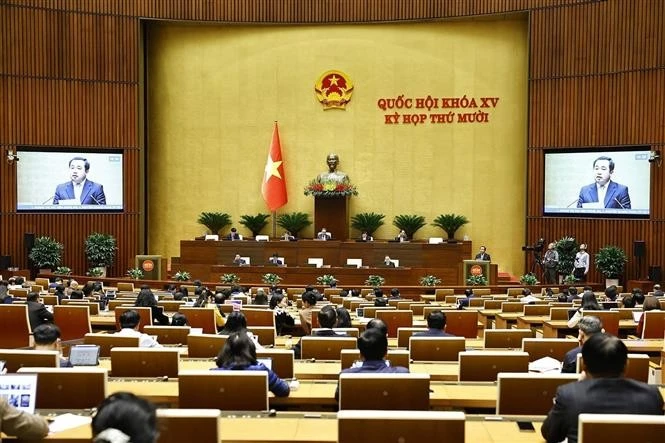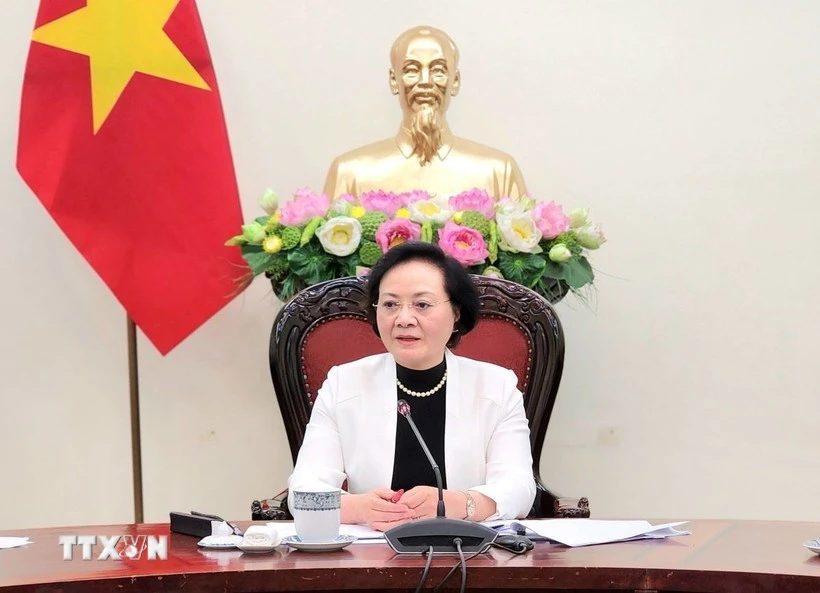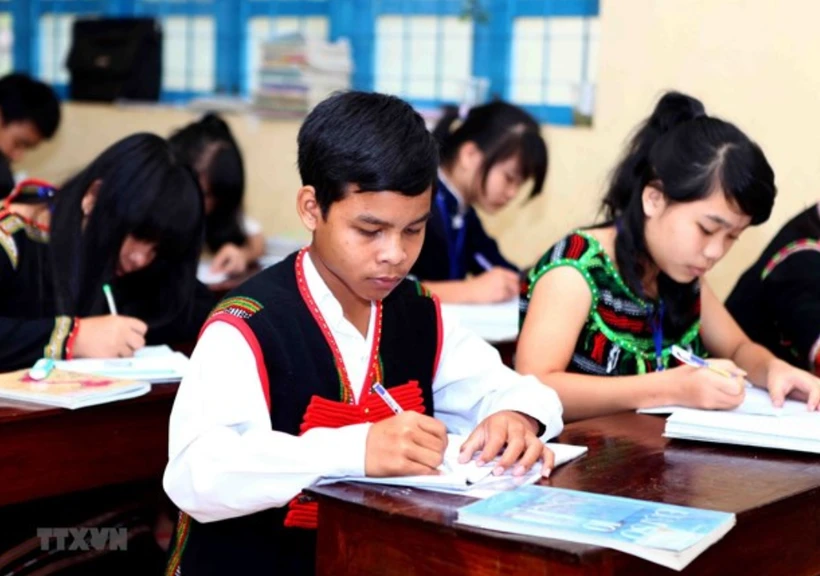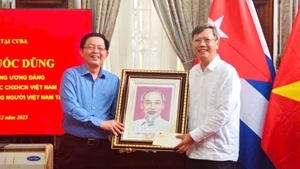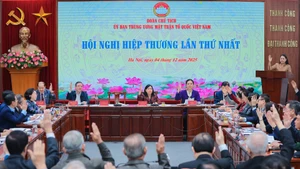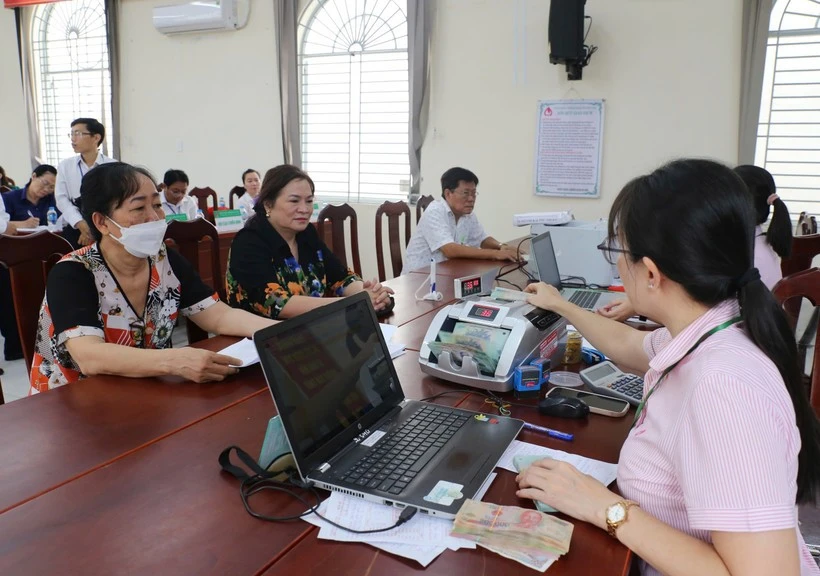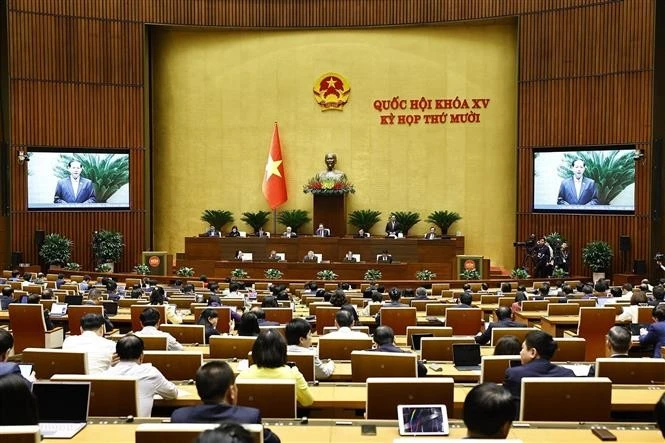Non-traditional security threats, information warfare, high-tech crime, and the abuse of cyberspace to undermine our Party and State are becoming increasingly sophisticated and intense.
In this context, officials form the core force and hold an especially important role, directly contributing to ensuring the solidity of political security, social stability and public trust. Unwavering political steadfastness and sharp theoretical thinking capacity are two fundamental pillars determining the quality and effectiveness of safeguarding national political security in the new situation.
A demand that is both urgent and long-term
In recent years, under the leadership of the Party, our contingent of officials has made remarkable progress in political steadfastness, professional competence, and moral qualities, increasingly meeting the requirements of renewal, international integration, and the protection of national political security. It can be affirmed that the majority of officials today maintain strong political determination, absolute loyalty to the Party, the Fatherland, and the people; remain steadfast in the goal of national independence and socialism; and consistently strive to fulfil their assigned tasks.
Many officials, particularly the younger generation, have demonstrated responsibility, dynamism, and creativity; proactively acquiring new knowledge and new technologies; and willingly taking on difficult, complex, and sensitive tasks, thereby making important contributions to safeguarding political security, maintaining socio-political stability, and ensuring public order and safety. In addition, emphasis has been placed on training and capacity-building for officials, helping to enhance political-theoretical competence, managerial capacity, and professional skills.
Many officials have effectively applied theoretical thinking, creatively utilising Marxism-Leninism, Ho Chi Minh thought, and the Party’s guidelines and policies in practice. Many have actively renewed working methods, applying digital technology, big data, and artificial intelligence in management and administration, thus improving the efficiency of state agencies and the political system.
However, in reality, the contingent of officials still reveals certain limitations. A number of officials are not truly firm in their political steadfastness and lack resolve when facing the multi-dimensional impacts of the negative side of the market mechanism, globalisation, and the fierce sabotage activities by hostile forces. Not a few officials show limitations in theoretical thinking and in analytical, synthesising, and forecasting capacity, leading to proposals and policy advice that are sometimes untimely or insufficiently grounded in reality.
Some officials display signs of dogmatism, mechanical thinking, and a lack of creativity, failing to strongly connect theory with practice; while others show signs of opportunism, pursuing personal interests, undermining principles, and deviating from revolutionary ideals. Manifestations of political, moral, and lifestyle degradation, as well as “self-evolution” and “self-transformation” among a segment of officials and Party members, though not widespread, constitute a major risk, directly affecting the Party’s prestige, fighting strength, and public trust.
In addition, many officials still have limited working skills, especially in the use of digital technology, foreign languages, and the ability to handle complex situations in cyberspace. This creates a gap compared with practical requirements for safeguarding political security in the digital era, when non-traditional security threats are becoming increasingly diverse and unpredictable. Slow cognitive renewal, reluctance to learn or conduct research, and even the attitude of “avoiding confrontation” or “fearing responsibility” among some officials are weaknesses hindering overall development.
Alongside internal limitations, today’s contingent of officials must also confront sizeable challenges. Strategic competition among major powers, rising regional conflicts, global political and economic volatility, and the rapid development of science and technology, especially digital technology and artificial intelligence, pose new demands on personnel work.
The intensified sabotage activities of hostile and reactionary forces in the ideological and theoretical domain, particularly in cyberspace, carried out through sophisticated and unpredictable tactics, require officials to possess sharp theoretical thinking and firm political steadfastness to recognise, counter, and defeat them effectively. Domestic socio-economic transformations with emerging issues such as wealth disparity, cultural and social changes, and pressures from international integration also directly affect the mindset, sentiments, and attitudes of officials. The modern societal trend towards individualism, materialism, and the pursuit of personal gain also significantly affects the environment for officials’ self-cultivation and moral development.
The new context sets out both urgent and long-term requirements for building the contingent of officials. Fully promoting strengths, overcoming limitations, and addressing challenges to build a team of officials who are “both virtuous and competent”, firmly politically steadfast, sharp in theoretical thinking, intellectually capable, and morally upright is a strategic mission determining the Party’s strength and the country’s sustainable development.
President Ho Chi Minh once emphasised: “Success or failure of all undertakings depends on whether officials are good or bad.” This teaching is even more meaningful today as the country enters a new stage of development full of intertwined opportunities and challenges.
Improving political steadfastness and theoretical thinking capacity
In the context of globalisation, digital transformation, strategic competition among major powers and increasingly complex non-traditional security challenges, enhancing political steadfastness and theoretical thinking capacity for officials is not only an urgent requirement but also a strategic task determining the Party’s strength and the regime’s endurance. This work must be conducted in a comprehensive, continuous, and persistent manner, with multiple simultaneous solutions.
First, political and ideological education must continue to be strengthened so that each official firmly grasps and deeply understands Marxism-Leninism and Ho Chi Minh thought and remains steadfast in the goals of national independence and socialism. This is the “root” for cultivating political steadfastness and the basis for officials to remain firm in the face of difficulties and challenges. The documents of the 13th Party Congress state: “Strengthen political, ideological, moral, and lifestyle education; arouse the aspiration for a prosperous and happy nation.” This serves as a compass guiding the development of a contingent of officials who are ideologically steadfast and politically firm.
Alongside this, it is essential to promote theoretical research and regularly update new knowledge, especially on issues relating to non-traditional security, information warfare, the Fourth Industrial Revolution, artificial intelligence, big data, and cyber security.
The documents of the 13th Party Congress state: “Strengthen political, ideological, moral, and lifestyle education; arouse the aspiration for a prosperous and happy nation.” This serves as a compass guiding the development of a contingent of officials who are ideologically steadfast and politically firm.
As these challenges intensify, officials who lack modern theoretical knowledge and fail to update new information will find it difficult to analyse and forecast situations accurately, leading to confusion in policy advice and implementation. Therefore, theoretical research and practical reviews must be prioritised, closely linked with renewed content and training programmes at academies, political schools, and training institutions. Political-theoretical training must be firmly combined with practical work experience.
Agencies and units should focus on assigning officials to handle difficult, complex, and sensitive tasks to help strengthen their political steadfastness and enhance their analytical and forecasting skills. Through practice, officials can compare theory with reality and thereby grow more quickly and comprehensively.
The role of exemplary conduct, self-learning, and self-cultivation must be upheld. Political steadfastness and theoretical thinking capacity are not only formed through formal training but also through persistent self-learning and self-discipline. Each official must constantly engage in self-reflection and self-improvement, linking theoretical study with practising revolutionary morality and resolutely combating individualism and materialism.
President Ho Chi Minh’s teaching that officials must “always study — study theory, study experience, study work, study the people; study throughout life, never be complacent” must be deeply internalised and become a guiding principle for every official. At the same time, the exemplary role of leaders and managers is extremely important, for as he said: “A living example is worth more than a hundred propaganda speeches.”
Particularly, mechanisms and policies for building a contingent of officials who are “both virtuous and competent” must be perfected to meet new requirements. Policies must be put in place to recruit and employ talented individuals, along with remuneration systems that encourage dedicated and responsible officials who dare to think, dare to act, and dare to make breakthroughs for the common good.
At the same time, screening mechanisms must be strengthened to resolutely remove officials who are degraded, incompetent, or have lost credibility, thus ensuring a truly clean, strong, and capable contingent. Personnel rotation and planning must also be emphasised, creating conditions for young officials to be tested and trained in diverse environments to accumulate experience and enhance theoretical thinking and political steadfastness.
Experience shows that to fulfil their missions, officials must possess a combination of good qualities and competence. Among these, political steadfastness and sharp theoretical thinking are the two core and decisive factors. Political steadfastness enables officials to remain firm against all sabotage schemes and tactics of hostile forces, without wavering or falling into “self-evolution” or “self-transformation”. Theoretical thinking capacity enables officials to correctly identify the essence of issues, firmly grasp the laws, make accurate forecasts, and thus propose and organise the implementation of appropriate and effective solutions.
Continuously improving political steadfastness and theoretical thinking capacity for officials is not only an immediate requirement but also a long-term strategy ensuring the Party’s strength and political and social stability as well as the sustainable development of the country. This is the shared responsibility of the entire political system and, at the same time, a process of ongoing self-awareness, self-cultivation, and self-striving for every official and Party member.
